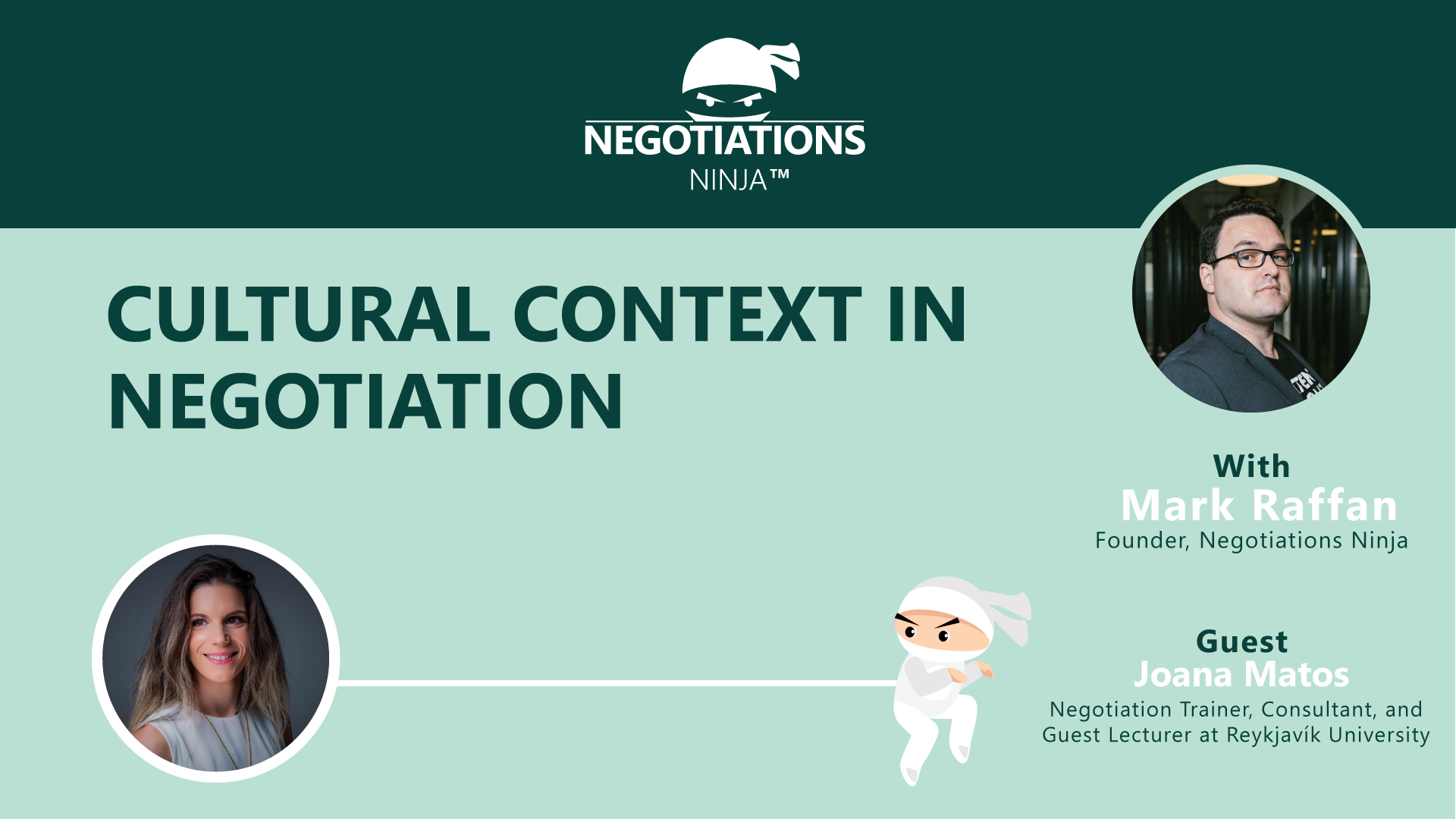How does culture impact negotiations? Why does culture matter? Why should you care? Joana Matos—a negotiation trainer, consultant, and guest lecturer at Reykjavík University—was born in Portugal and has lived in Iceland for over a decade. In this episode of Negotiations Ninja, she shares some of the cultural differences she’s learned and why understanding someone’s cultural context is important.
Outline of This Episode
- [2:05] Learn more about Joana Matos
- [2:50] The over-reliance on globalization is crippling
- [6:27] How Icelandic people negotiate
- [11:38] How to prepare for a negotiation
- [18:13] Understanding Icelandic body language
- [19:53] Why you shouldn’t steal rocks in Iceland
- [23:20] A culture’s history drives everything
The over-reliance on globalization is crippling
We live in a globalized world. So why does cultural context matter in negotiation? Joana notes that if we assume that we are all exposed to and consuming the same information, we’re setting ourselves up to be blindsided. Everyone has different cultural norms, values, and standards of fairness. Even though so much is shared, we can’t underestimate the power of cultural differences.
When people talk about culture, it includes gender culture, religious culture, education culture, etc. Even your company culture impacts your negotiation. In North American culture, we expect to do business quickly—not to spend a year building relationships. But there are differences in expectations in terms of speed, communication style, and even eye contact between cultures. These things can’t be ignored.
How to prepare for a negotiation between cultures
Joana notes that preparation can even compensate for a lack of expertise. If you prepare, you have a better chance of doing well. You also have to be curious. Who is this person? You have to make assumptions and then assess. If someone is Canadian, you might expect them to be friendly. But then you have to do your homework. It helps you create a picture.
You could hop on LinkedIn and see that your Canadian counterpart has experience negotiating in a different country, which means their style might be influenced by that culture. What other influences might be relevant?
If you try to negotiate with Joana, you might learn in your research that she was born in Portugal. Because of Portuguese culture, you might assume that she’ll be late for the meeting. But her time in Iceland has influenced her greatly, so she’s usually on time.
Joana notes that it can be offensive to make a general assumption about a person. However, a generalization isn’t necessarily wrong. Do your homework to nail down the behaviors you might expect. Make an assumption and then assess it based on research.
Understanding the cultural context is key
In some cultures, eye contact is disrespectful. In others, you have to make eye contact. You can’t assume that when someone isn’t making eye contact, they’re insecure or don’t trust you—the behavior might be a sign of respect. The same goes for silence.
Asian countries utilize silence when they negotiate. To them, silence is positive. They’re taking in information and being respectful. But if you’re uncomfortable with silence, you need to make sure you don’t start negotiating with yourself. Silence doesn’t always mean they’re waiting for a concession.
Germans are not fond of small talk. They want to get down to business. But Italians don’t negotiate until they finish their espresso. If you jump the gun, it’s disrespectful. Icelandic people aren’t fond of strong manifestations of emotion. They’re rational and expect you to be the same way.
So what do you do? Read books about different cultures. Plan a visit and have conversations with locals. Your research sets the stage.
Is the culture collaborative or competitive?
You have to determine if a culture is more collaborative or competitive. Icelanders are friendly people who are more collaborative negotiators. They’re open to finding solutions and working together.
But she points out that Icelanders can oscillate between competitive and cooperative, depending on the importance of the relationship. If it is important, they’re more collaborative. She believes you’ll have a good experience when negotiating with an Icelandic company.
Iceland is also very informal—you could address the President by his first name. That doesn’t mean they aren’t assertive. They can come across as blunt or cold. But once you break through that barrier, they are warm and funny.
Tune in to the whole episode to learn more cultural context in negotiation (including some interesting facts you should know about negotiating in Iceland).
Resources & People Mentioned
Connect with Joana Matos
- Connect on LinkedIn
- Rational Games
Connect With Mark
- Follow Negotiations Ninja on Twitter: @NegotiationPod
- Connect with Mark on LinkedIn
- Follow Negotiations Ninja on LinkedIn
- Connect on Instagram: @NegotiationPod




